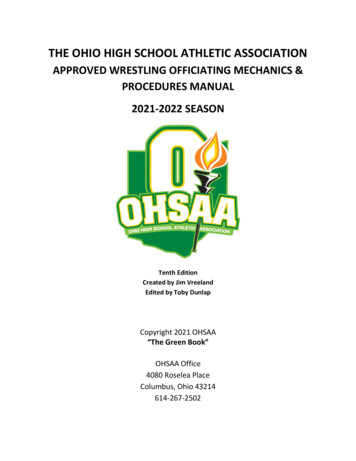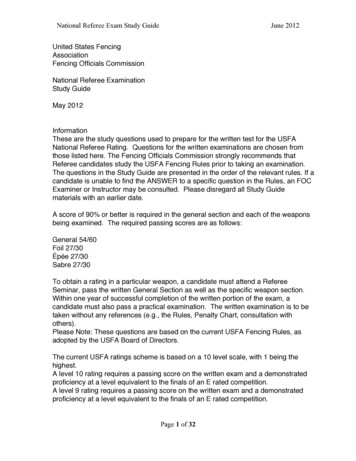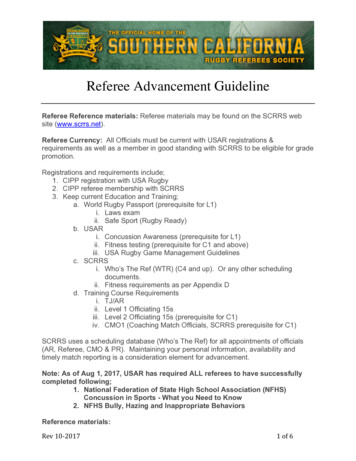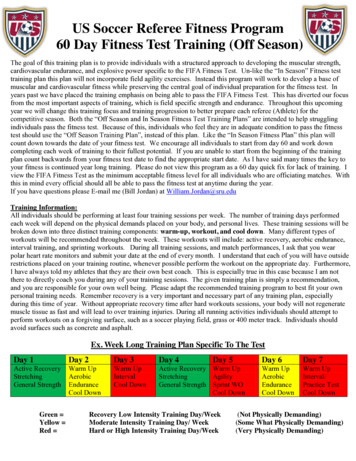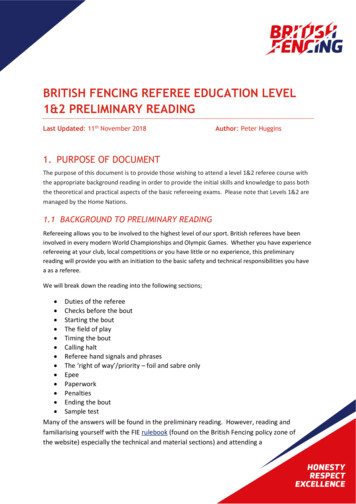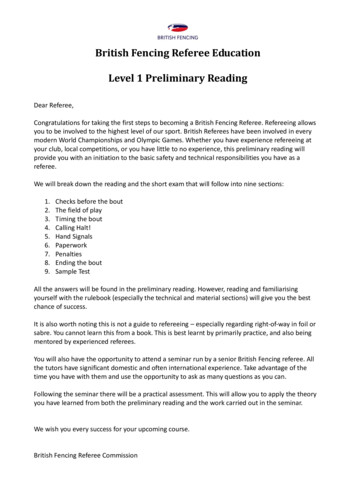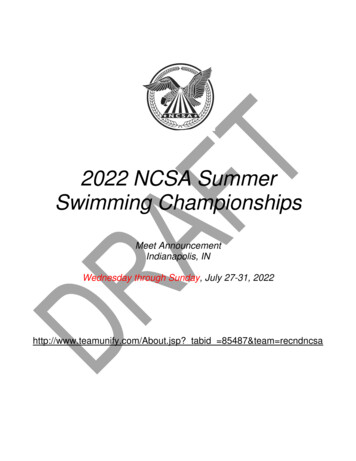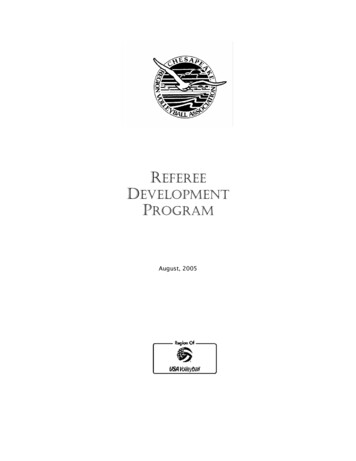
Transcription
REFEREEDEVELOPMENTPROGRAMAugust, 2005
IntroductionChesapeake Region Volleyball Association (CHRVA or "Region") officials can progress throughsix referee classifications: Recreational, Provisional, Regional, Junior National, USA-National, andInternational. Recreational, Provisional, and Regional referees are certified by the Region. JuniorNational referees are certified by USA Volleyball (USAV) upon recommendation by the Region. USANational referees are certified by USAV. International referees are certified by the International VolleyballFederation (FIVB) upon recommendation by USAV.The purpose of this Regional guide is to explain the program, process, prerequisites, andlogistics to becoming an upper echelon referee in the Chesapeake Region.Self-DevelopmentThe Region will provide the platform and support; you provide the initiative, time, and effort.Build a current and complete knowledge base. Memorize the rule book. Assimilate the correctrulings for specific playing situations described in the Referee Case book. Know the proper officiatingfundamentals detailed in the Regional guides for first and second referees. Learn diverse officiatingtechniques and philosophies from various officiating partners. Be a regular spectator of higher levelcompetition. Watch the first and second referees for pointers on mechanics, techniques, play calling, andmatch control. Observe the sophisticated skills, techniques, and strategies of the players and teams.Analyze complex "receive" formations to identify potential and actual overlaps.Officiate, officiate, officiate. Growth mainly comes from experience. Officiate often and continually inall types of competition to better your first and second referee skills, establish personal comfortablestandards for making correct, consistent ball handling calls, and learn to deal with adversity effectively.Enhance first referee skills in USAV-affiliated tournaments, high school matches, and collegiate matches,which also are opportunities to develop second referee skills. Adult recreation leagues present a widespectrum of playing and ball handling abilities in a more relaxed setting.Strive to become competent officiating the top levels of competition. Seek increasingly difficultassignments that tax your ability. Become accustomed to officiating the top competition levels such thatall action appears to be in slow motion and all calls and non-calls are made correctly. Eliminate makingautomatic ball handling calls based on goofy, ugly, or surprising results or a player's irregular bodyposition. Review completed matches for mistakes made, disputed decisions (especially), and other areasneeding improvement. Make the needed corrections, and don't repeat the same mistakes. Solicit theguidance and input of USA-National and Junior National referees and other knowledgeable officials. Finda role model or a mentor. The onus is upon you to initiate all dialogue.Prepare for the environment of a Junior Olympic (JO) National tournament. Unfamiliar places,faces, and partners; huge facilities with numerous courts of constant bustle; successive grueling days;and different tournament procedures. Learn how to always produce peak performance under theseadverse conditions by officiating in a multi-day tournament outside the Region at least once a year. Mostof the tournaments suggested below provide lodging and pay (not enough to cover all expenses). OurReferee Chair can identify the contacts and other tournaments.·····Colorado Crossroads JO Qualifier (Junior Girls), late March, Denver.Northeast JO Qualifier (Junior Girls), Easter weekend, Baltimore (limited slots).Tampa Bay JO Qualifier (Junior Girls), Easter weekend, Tampa.Cajunland Classic (Junior Girls), Easter weekend, New Orleans.NIRSA Collegiate Club Nationals, April, varying sites (excellent, intense play).1
····East Coast Championships (Junior Girls), Memorial Day weekend, Penn State University.East Coast Championships (Junior Boys), Memorial Day weekend, Richmond.AAU Championships (Junior Boys and Girls), mid-June, Orlando.Cal-Davis Volleyball Festival (Junior Girls), late June, Davis, CA, (several perqs).Skills and AbilitiesAim to become as accomplished as a USA-National referee, nothing less.Knowledge. Become a walking encyclopedia and correct knowledge practitioner of officiating.First referee. Have a polished presence; be calm and self-assured with proper, unrushed fundamentalsdone metronomically and naturally. Be able to keep up with the playing action of top competition levels.Be correct and consistent on all ball handling calls; no more automatic calls. Exude confidence in all callsand non-calls. Use sanctions judiciously and effectively. Maximize teamwork while minimizing matchdelays.Second referee. This often-neglected position is as important as and requires more effort than a firstreferee. Readiness for prime-time is evident by correct positions, movements, and signals for each rally;detection of overlaps in complex "receive" formations; awareness and proper recognition of back rowattacks and blocks; anticipation and immediate handling of requests; appropriate communication with andsupport for the first referee; accurate calling of net violations; and effective bench control.Professional character and attitude. Do not denigrate fellow officials. Show integrity and fine ethics.During any officiating capacity be all-business, dignified, pleasant, and impartial; have impeccableuniform and grooming. Give your best efforts regardless of playing level or venue. Command withdiplomacy and respect, never by being overbearing or arrogant.CommitmentFact: Officiating must become one of your life's priorities. Assess your seriousness beforepursuing your officiating ambitions further. You must prove your dedication in the following disciplinesbefore the Region will consider you for Junior National referee advancement.Work ethic. Be available and willing to work as a non-player referee in any type of competition, travelfar and wide, and cover emergency assignments from your referee assignors. Seek officiatingassignments. Work often and continually, not just the minimum requirement.Self-development. Improve your skills and abilities as a first referee and as a second referee to thecompetency required for top competition levels. Get acclimated to a JO National tournamentenvironment by officiating in a multi-day tournament outside the Region.Contribution to Regional operations. Be more than a minimal rater of officials each season. Beactively involved in an administrative Regional capacity such as Board of Directors, a tournamentcoordinator, or a Regional committee member or assistant by volunteering with the Commissioner.Training and Development ProgramReferee Development Program. A Referee Development Program ("Program") with a designated2
coordinator has been created by the Region for formal training and development of referees withaspirations to improve and advance. This is a two-tiered program. The first tier is for officials wishingonly to improve their skills. The second tier is for those wishing to advance. To participate in theProgram, annual attendance of a preseason Program clinic is required.Advisors. Each second tier Program participant will be able to choose a personal advisor from aprovided list of qualified advisors.Assignments and feedback. Second tier Program participants will be given priority by the Region'sReferee Assigner to increasingly challenging assignments within their capability. Second refereeassignments are limited; consider being a voluntary second referee at top level USAV-affiliatedtournaments. Be aggressive in soliciting advice and critique from knowledgeable officials watching yourmatches. Be open-minded and not defensive of any input. Logistics permitting, each season eachProgram participant will be videotaped with ongoing critique while officiating a match as a first referee andpossibly as a second referee.Training and evaluation. Collegiate matches with two assigned referees will be used for viewinginstruction. Critique and comments on the actions and decisions of the first and second refereesthroughout the match will be provided by an expert observer to the on-looking Program participants.Once a year each second tier participant will be formally evaluated as a first and second referee, usuallyin an RDP Camp. Those not participating in these camps should schedule individual evaluations with theProgram coordinator.Annual progress review. By June 15 second tier participants must send to the Program coordinator alist of their officiating experience and Regional contributions for the transpired season. Each summer theRegion's Referee Chair, Assignor, and development coordinator will jointly review all Programparticipants' progress.Regional Qualifications for Junior National CandidatesFirst and foremost, you must demonstrate your skills proficiency as a first and second referee asdiscussed above and in the respective Regional guides for first and second referees. You must alsosatisfy the following minimum requirements.·······Be a current participant of the Region's Referee Development Program for at least twoUSAV seasons.Have professional and moral character.Be certified as a USAV Regional referee for the last two completed seasons.Serve as a rater in two fellowship tournaments in the most recent fellowship season.Officiate as a non-player referee in six regular season USAV-affiliated tournaments in thelast completed season. Two of these must be either a Men's A, Men's AA, Women's AA, orMen's Collegiate Club tournament. One must be a Juniors tournament.Officiate in one Regional championship in the last completed season.Officiate in one multi-day tournament outside the Region in the last completed season.Regional Process to Select Junior National CandidatesApplication. Only those referees satisfying the above Regional qualifications may apply for selection asJunior National referee candidates. An application including a free-form application letter must be newlysubmitted to the Program coordinator by August 1st of the current season. The letter must include thereason(s) for wanting to become a Junior National referee and specific dates and details on how each of3
the above qualification requirements were met.Selection. By March 15th, our Region's Referee Chair with input from the Program coordinator, willselect the Junior National referee candidates from among the qualified applicants. The Region will onlyselect qualified applicants and is not limited by USAV in the number of candidates it may select.However, USAV may have a limited number of Junior National Candidate slots available each season. Insuch cases, potential candidates will be ranked by their abilities.Certifying TournamentSelected candidates for Junior National referee certification may be sent to the first (Girls)session of the JO National Championships. The remaining discussion of this guide is oriented for the JONational Championships.USAV AdministratorsThe Assistant Vice President of the USA-National Referee Commission oversees all USANational and Junior National referees. He/She or a designee will be Head Referee of your certifyingtournament. Kathy Ferraraccio, National Commissioner for Referee Certification and Evaluation,oversees the national rating program with Charles Ezigbo, National Commissioner for Junior NationalReferee Certification and Development. Kathy or a designee will head your rating process. The HeadRater and all raters make up the Rating Committee. The Assignment Committee does the computerizedmatch assignments with guidance from the Head Referee and Head Rater.USAV ApplicationThe National Officials' News, issued in January to all national-level officials, contains pertinentinformation about the JO Zonal Qualifying Tournaments, all USAV national championships, and therequisite registration forms. Complete the Junior National referee candidate application form provided byour Referee Chair from the January issue. After being signed by our Referee Chair, mail the completedform with a one-time 75 fee to the designated registrar before the specified deadline.Travel and LodgingYou're on your own to arrange and pay for travel and lodging, and find a roommate. The NationalOfficials' News will have housing information for the JO National Championships. Plan to be at thetournament at least for the entire session. Arrange for your own daily transportation if no van is providedto shuttle officials between the main lodging and the tournament site.Certification PreparationGain insights from referees who recently underwent the rating process. Review the rule bookand Case book. Work higher level matches. Have knowledgeable referees review and refine yourofficiating mechanics and skills. Hone your skills as a second referee, which is equal in rating weight to afirst referee. Stay sharp by officiating within two weeks of certification. Eliminate outside distractionsfrom the rating process by getting your affairs in order beforehand.4
BringPack your uniform (ensure it's flawless), officiating gear, rule book, Case book, and Regionalregistration card. Pack your official's sweater; most tournament sites are well cooled. Bring pens and acompact note pad for meetings, rating sessions, and recording assignments. A marked garment bag willprotect your uniform and clothing at the tournament site. A gym bag can transport personal belongingsdaily.USAV Tournament SiteThe JO National Championships will be played in a convention center. The Championship Deskwill be the central location for the tournament directors ("Championship"), the Head Referee, the HeadRater most times, and all game equipment, i.e., balls, towels, line judge flags. There may be auxiliaryChampionship Desks for remote courts. The Sport Court courts will usually be numbered on the poles.The 55-gallon plastic water barrels anchoring the net poles will require adjustment of positioning andmovement as a second referee.An officials' workroom with referee and scorekeeper duty stations will be set up for officialsbetween assignments and for posting assignment schedules and important notices. A communaldressing room where uniforms may be left overnight will be set up in or next to the workroom. Anofficials' dining area may also be set up. Warning --- no conversation is private in these rooms. Keep outof the Assignment Committee computer room and Rating Committee room unless authorized.Tournament RegistrationReport to the officials' workroom referee duty station for essential forms and a possible playingfacility pass. Complete three forms: a personal information sheet, a W-9 form for IRS reporting, and anOfficials' Conflict Sheet to indicate your planned tournament departure and the time periods you will beunavailable for assignments. Sorry, candidates must be present and available for the entire duration ofthe rating process.MeetingsNotices for officials' and candidates' meetings will be posted in the officials' workroom. Missingeither meeting is a definite no-no for candidates. The officials' meeting is usually held the day before thetournament. Pay attention because the tournament and match procedures, protocol, ground rules, andplaying rules may differ from our Region. Ask questions only if necessary. The candidates' meeting topreview the rating process with the Rating Committee follows the officials' meeting. Ask questions galore.Candidate mug shots will be taken and exhibited.Food ServiceSnacks and soft drinks may be provided for officials to ease one's hunger while waiting to do thenext assignment. It is not intended to provide your entire nutritional intake for the duration of thetournament. Please respect these intentions.5
Match AssignmentsPosting. Matches are scheduled as early as 8:00 AM, as late as 9:45 PM. One of several possibleassignment schemes is two straight matches, break, two more matches, break, and so forth. Apreliminary assignment schedule for the next day is usually posted around dinner time in the officials'workroom. Targeted posting of the next day's complete assignment schedule is by close of business.Schedule types. There are two kinds of assignment schedules: a match grid and an alpha list. Thematch grid is a matrix of courts versus scheduled match times. Each individual match will display theassigned first referee (R1), second referee (R2), and line judges (L1 and L2). Being L1 or L2 means youare to be rated as an R1 or R2 candidate, respectively, with your raters listed as R1 and R2. The alphalisting displays each official's assignments for that day in HH:MM/CC/T format, where:HH:MM timeCC court numberT assignment type1 (R1), 2 (R2), or L (line judge).For example, "9:15a/22/2" is an assignment at 9:15 AM on court 22 as a second referee.Changes and misses. Changes to assignments are authorized for candidates by the Head Rater only,and for other referees by the officials' workroom referee duty officer or the Head Referee. Thesechanges will be recorded on the workroom match grid schedule and later in the assigning computer. Ifyou miss an assignment, you must report to the Head Referee (Head Rater if candidate) and may bereplaced for the rest of that day's assignments. A second missed assignment warrants tournamentdismissal.Match Administrative ProceduresBefore going (with your partner if possible) to a court for an assignment, initial alongside yourname on the match grid schedule at the officials' workroom referee duty station and, if required, pick upthe match's prepared scoresheets from the scorekeepers' duty station. Be present and ready at theassigned court at least 20 minutes before the scheduled match time. If that court's game balls, towels,and line judge flags are not available from the referees working the previous match, the second refereemust obtain them from the Championship Desk. After the match the game equipment is to be turned overto the court referees for the next match, or the second referee must return them to the ChampionshipDesk with the completed scoresheets.Rating ProcessBe ready for a performance and endurance test full of stress and anxiety. Have a positiveoutlook, no matter what happens.Rating sessions. Over the course of three days, expect to be rated on at least the first two days as afirst and second referee. The number of ratings will vary for individual candidates. You may work anunobserved match first if the Rating Committee has that luxury. Ratings usually will be done for twostraight matches with another candidate. Perform all pre-match procedures and protocol. Right afterboth matches, the raters will meet with both of you for performance critiques. Listen. Take notes on yourdeficiencies and suggestions offered. Ask questions if something is unclear. Never get defensive orargumentive. Smile, even if it hurts. Review your rating sheets before signing. Get clarification onundiscussed notes. Note your rating score; 88 or greater is passing.6
Corrective action. Review the main critique issues from the rating session and focus on improving yourdeficiencies. Make immediate technical adjustments if you missed calls, made improper calls, or hadincorrect fundamentals. During the duration of the rating process incorporate a suggested style changeonly if you are comfortable doing it and the change is compatible with your officiating style. Otherwise,avoid getting discombobulated during the rating process and wait until after the tournament to sort outthose suggested style changes that are best for you.Concerns and help. During the rating process discuss your major concerns with the Head Rater. Also,our Referee Chair or any of our Region's USA-National or Junior National referees at the tournament canbe relied upon for advice and moral support. Bear in mind that any of our referees who are raters cannotdiscuss matters related to a candidate's evaluation status.Notification. The Rating Committee will meet nightly to discuss their observations of individualcandidates. Around the end of the third day, you will be informed individually by the Head Rater whetheryou passed or, heaven forbid, failed. All candidates will later have an opportunity to comment formally orinformally on the rating process and their respective raters.Post-Certification. You will receive a Junior National referee patch upon being certified. Upon yourreturn to the region, share your experiences with the RDP program coordinator and with aspiring officials.Be a role-model for other officials. Plan on getting more involved in leadership positions within theregion.Juniors TipsMatch control is strongly emphasized. Do not hesitate to sanction deliberate misbehavior. Useextreme discretion when contact with parents is unavoidable. Be intimate with the scoresheet to help theplayer scorekeeper unravel scoring problems quickly. A 14s or 12s coach has the same rights as aplaying captain.Free TimeTour, shop, frolic . anything to prevent tournament burnout. However, be well rested for yournext assignments. Network and exchange ideas with officiating colleagues. Volunteer as line judge orfor support duty such as van driver. Learn from previously unseen USA-National referees officiating,especially the raters. Imbibe only after being done for the day and never while in official's attire.Tournament PayCandidates are not paid for any matches worked prior to being certified as Junior Nationalreferees. The USAV National Office will send a payment check for matches and support hours workedabout a month after the tournament and a 1099 at the end of the year.Leaving the TournamentCheck-out. Check out at the officials' workroom referee duty station. Verify the Matches and HoursWorked Report against the matches and support hours you worked. Annotate all discrepancies onto thereport. Ensure your completed W-9 is in file, else no payment check. Update your Officials' ConflictSheet with your actual departure date and time.7
Return to Region. Inform all volleyball decision makers of your new esteemed position. Be allegiant tothe obligations of a Junior National referee.Junior National Referee ObligationsMany influential people will have vested interests in your expected fulfillment of additionalobligations when you become a Junior National referee.Region. You must be a vanguard of our officiating program at the behest of our Referee Chair. You willbe assigned to an administrative position such as Fellowship Committee chair/member, Referee Assignorassistant, rating/recertification monitor, and Juniors referee coordinator. At least once a year you will beexpected conduct a Regional preseason referee clinic. Be a proactive, accessible advisor and booster ofour lesser-experienced referees. Be available to rate referees for new certifications, recertifications, orupgrades.USAV. You will be certified for four years. To recertify you must officiate at the minimum in two JONational Championships, and in either a JO Qualifying Tournament or a JO National Championships inanother year. You may miss only one year in the four-year period.Officiating profession. As a role model, always maintain high performance and moral standards, andavoid conduct unbecoming an official. As a regarded officiating guru, be well versed on rules andregulations, referee mechanics and techniques, and game strategies. Continue to officiate often in allcompetition levels and venues. Your expertise, experience, and visibility will benefit all those present.Advancement to USA-NationalYou must remain in good standing with USAV and especially the Region by fulfilling your JuniorNational referee obligations. You must remain an active member of the RDP program. You must havecontinued to develop your officiating skills.Application. Only existing Junior National referees certified in a prior USAV season may apply foradvancement to a USA-National referee. Junior National referees newly certified in the current seasonare not eligible. A formal request for a screening evaluation to advance must be submitted by March 1 tothe National Commissioner for Junior National Referee Certification and Development. Applicants will benotified by May 1 whether their request has been accepted.Screening process. The second (Boys) session of the JO National Championships and (for those withserious schedule conflicts) the "A" Division of the U.S. Open Championships will be used to screenaccepted applicants wishing to be upgraded to a USA-National referee. Accepted applicants will beevaluated as first and second referees using performance standards higher than for a Junior Nationalreferee. The Rating Committee then will inform the evaluated applicants individually whether theyqualified as candidates to become a USA-National referee.Certification. The qualified USA-National referee candidates will be certified the following year at eitherthe NIRSA Collegiate Club Championships (by submitting a request by February 1 to the NationalCommissioner for Referee Certification and Development) or the U.S. Open Championships. The USANational referee certification process is similar to that of a Junior National referee.8
form with a one-time 75 fee to the designated registrar before the specified deadline. Travel and Lodging You're on your own to arrange and pay for travel and lodging, and find a roommate. The National Officials' News will have housing information for the JO National Championships. Plan to be at the tournament at least for the entire session.



